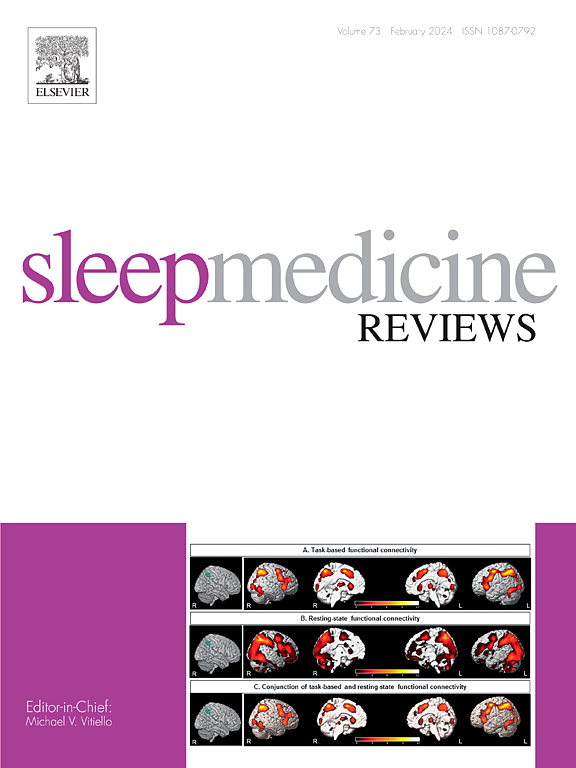失眠与情绪失调:整合调节策略与处置困难的元分析视角
IF 9.7
1区 医学
Q1 CLINICAL NEUROLOGY
引用次数: 0
摘要
失眠和情绪失调错综复杂,但它们在不同情绪失调领域的总体关联以及健康状况、年龄和性别等调节因素的影响尚不清楚。本系统综述和荟萃分析综合了来自57项研究的数据,汇集了来自相关研究的119个效应量和来自组比较研究的55个效应量。通过单独的分析,我们评估了这种关联的强度,以及临床显著的失眠症状是否会加剧调节情绪的困难。相关分析显示,失眠症状与情绪失调之间存在显著关联,主要发生在患有严重健康相关疾病的个体中(Fisher zserious -condition = 0.22, Fisher Zserious-conditions = 0.37, p <;0.00001)。组间比较分析显示,无论健康状况如何,具有临床显著失眠症状的患者存在更严重的情绪失调(Hedges’g = 0.99, p = 0.01)。与适应策略相关的挑战相比,对不适应情绪调节策略的依赖和情绪调节处置领域的困难,特别是冲动性,与失眠的关系更强。在两种类型的研究中,年龄和性别对这些关联没有影响。这些发现强调了失眠和情绪失调之间的紧密联系,表明将情绪调节技能整合到失眠管理中以改善治疗效果的潜在益处。本文章由计算机程序翻译,如有差异,请以英文原文为准。
Insomnia and emotion dysregulation: a meta-analytical perspective integrating regulatory strategies and dispositional difficulties
Insomnia and emotion dysregulation are intricately related, yet their aggregate association across different domains of emotion dysregulation and the effect of moderating factors including health-related status, age, and gender remain unclear. This systematic review and meta-analysis synthesized data from 57 studies, pooling 119 effect sizes from correlational and 55 effect sizes from group comparison studies. By separate analyses, we assessed both the strength of the association and whether clinically significant insomnia symptoms exacerbate difficulty in regulating emotion. Correlational analyses revealed a significant association between insomnia symptoms and emotion dysregulation, primarily in individuals with serious health-related conditions (Fisher Zno-serious condition = 0.22, Fisher Zserious-conditions = 0.37, p < 0.00001). Group comparison analyses indicated that clinically significant insomnia symptoms present worse emotion dysregulation regardless of health-related status (Hedges’ g = 0.99, p = 0.01). The reliance on maladaptive emotion regulation strategies and difficulties in dispositional domains of emotion regulation, particularly impulsivity, were more strongly associated with insomnia than challenges related to adaptive strategies. Age and gender did not impact these associations in either type of study. These findings underscore a robust link between insomnia and emotion dysregulation, suggesting the potential benefits of integrating emotion regulation skills into insomnia management to improve therapeutic outcomes.
求助全文
通过发布文献求助,成功后即可免费获取论文全文。
去求助
来源期刊

Sleep Medicine Reviews
医学-临床神经学
CiteScore
20.10
自引率
3.80%
发文量
107
期刊介绍:
Sleep Medicine Reviews offers global coverage of sleep disorders, exploring their origins, diagnosis, treatment, and implications for related conditions at both individual and public health levels.
Articles comprehensively review clinical information from peer-reviewed journals across various disciplines in sleep medicine, encompassing pulmonology, psychiatry, psychology, physiology, otolaryngology, pediatrics, geriatrics, cardiology, dentistry, nursing, neurology, and general medicine.
The journal features narrative reviews, systematic reviews, and editorials addressing areas of controversy, debate, and future research within the field.
 求助内容:
求助内容: 应助结果提醒方式:
应助结果提醒方式:


